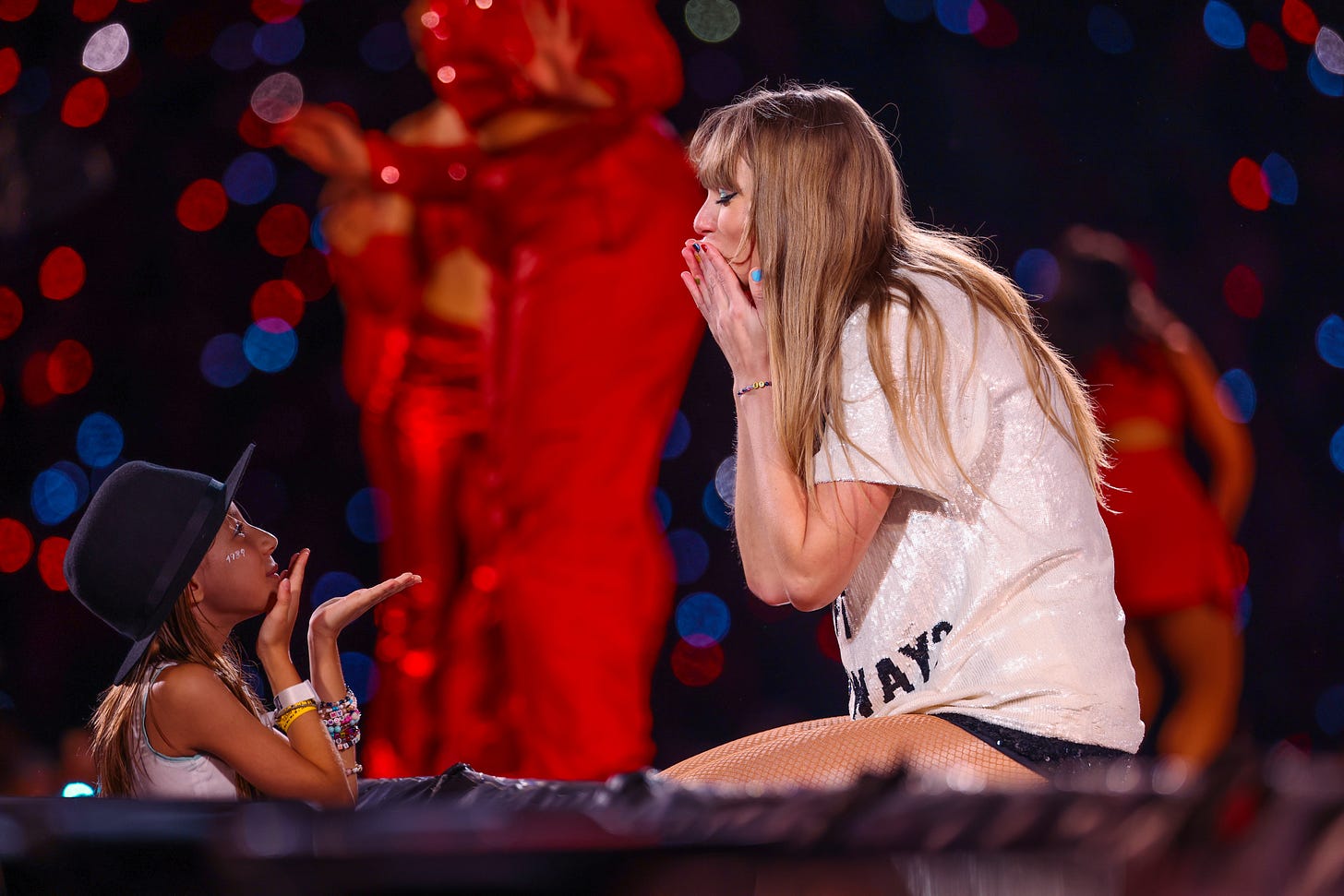
[This blog will always be free to read, but it’s also how I pay my bills. If you have suggestions or feedback on how I can earn your paid subscription, shoot me an email: cmclymer@gmail.com.]
Yesterday, obscure singer-songwriter Taylor Swift got her big break and was honored as TIME Magazine’s Person of the Year.
This is the second time she’s been recognized with the title, along with being part of the “Silence Breakers” cohort honored by the magazine in 2017, making her the first woman to achieve this twice.
She’s also, technically, the first Person of the Year to be honored specifically for impact and influence deriving from her artistic achievements.
Predictably, her selection has been controversial, and I find it delightful. It’s a goddamn treat. Few things are more instantly pleasing to me than a certain type of man being irrationally disgruntled at the thought of a woman being at the top of the heap.
I am 100% here for Taylor Swift being named TIME’s Person of the Year because of how much it clearly pisses off insecure men who find it unthinkable that a public figure adored this much by young women could be so undeniably powerful.
But moreover, any grown adult taking TIME’s Person of the Year seriously enough to get angry over it is hilarious to me.
Setting aside its enduring prestige for a moment, if we’re looking just at the objective nature of all this, Person of the Year is far more arbitrary than, say, an Oscar, and only a few notches less arbitrary than an MTV Video Music Award (of which Ms. Swift has won 23—second only to Beyoncé—which am I pointing out, again, to annoy a certain type of insecure man who inexplicably cares about these things).
That is to say, yes, this is an iconic honor, and also: people tend to place far too much importance on it, mostly because we’ve conditioned to hold it in reverence, most of us clearly needing to be reminded that this is a rather arbitrary decision made by a small group of people through a predominantly American lens.
Since 1927, the editors of TIME Magazine have annually selected an individual, group, idea, or object that “for better or worse… has done the most to influence the events of the year.”
This is, of course, for so many reasons, a fool’s errand, even if we pretend this is being deliberated in the spirit of that clear standard. (It is not.)
What is influence? What is impact? What is newsworthiness?
None of these terms have concrete metrics in this context. The only thing that matters here is that the editors are going off vibes, and then, much of the public will respond to the editors with “no, those vibes are wrong; what about my vibes?” and other parts of the public will respond to those members of the public with “No, your vibes are wrong, too — only my vibes are right”, etc.
Everyone in this conversation is going off vibes. There are very few people who actually care about this enough to present a comprehensive argument for why their selection is the right one, along with salient rebuttals to the selections of others.
TIME’s Person of the Year is the kind of cultural symbol that the vast majority of us usually take just seriously enough for basic acknowledgment but not so much that we actively give a damn. Others in this category include: the turkeys pardoned by the President every year, ringing the opening bell at the New York Stock Exchange, and, of course, the MTV Video Music Awards.
It’s a fun game we all play. The folks at TIME announce their decision with an appropriate attempt at gravitas. We, the public, debate it for a little bit and pretend to argue on the merits. Occasionally, as in 2006, the choice is widely mocked. And by New Year’s Eve, we’ve all forgotten to care.
But for several days following the announcement, some people seem to care a lot, and they never fail to trot out the eyeroll-inducing argument that takes a lazy stab at being edgy. They’ll say that if it were truly about having the most influence, certain unpopular people should have received the honor.
They’ll say Osama bin Laden had the most influence and impact on the world in 2001 or that Emperor Hirohito should have taken the title in 1941. I guarantee you, as I type this, there are edgelords somewhere online asserting that Hamas had the most influence on the world this year and should have thusly been named.
These people are almost always a certain kind of man who insists on explaining to you how the world works, especially if you’re a woman. They have far too much time on their hands. They are boring and insufferable.
If these men applied as much scrutiny to their personal lives as they do in shamelessly assessing the validity of women’s accomplishments through their lens of undaunted mediocrity, perhaps they wouldn’t spend so many of their waking hours in online chat forums whining to each other about supposedly compulsory chivalry on dates, which is ironic given that no woman has agreed to go on a date with them in many years.
They’re also the only ones who appear to not get this that this whole TIME’s Person of the Year thing isn’t meant to be definitive. It’s an honor given with a wink. It’s somewhere between a respected formality and an inside joke. Sometimes, it’s quite serious, and sometimes, it’s less-than-serious.
Here’s my unsolicited view: there’s a decent range of plausibility when it comes to global influence, and with enough superlatives, there’s a surprisingly long list of worthy choices for Person of the Year.
Taylor Swift undeniably falls in that range of plausibility. It’s not just that The Eras Tour will be the highest-grossing concert tour of all-time. Ever. Anywhere in the world. It’s not just that heads of state like President Gabriel Boric of Chile and Prime Minister Justin Trudeau of Canada have publicly lobbied Swift to include their countries on the international tour. It’s not just that the tour’s consumer net spending ($4.6 billion, so far) is more than the GDP of almost 50 countries.
It’s not just that USA Today hired a reporter specifically to cover all things Taylor Swift or that the NFL went into hyperdrive merchandising when Swift began dating Kansas City tight end Travis Kelce (and even changed their social accounts into unapologetic Swiftie fandom) or that no less than Billy Joel and Paul McCartney have ranked Swift among the all-time great songwriters.
It’s not just that Swift helped register more than 35,000 new voters with one (1) short message on her Instagram or that some conservatives clearly perceive her as an enormous electoral threat and have been attempting to diminish her standing (to no effect.)
All of that is neat and make for persuasive talking points in favor of the selection, but for me, it’s just the sheer ubiquity of Taylor Alison Swift. She is, outside of a select group of heads-of-state, the most famous person in the world. She is certainly the most famous non-officeholder in the world. And she is absolutely the most famous anyone has ever been without being problematic.
Swift holds so much power at the moment—a global bully pulpit on steroids—that she could plausibly, in theory, shape world events on any given day, should she choose to do so.
To fans of Swift and most people under the age of 40, this has been a long time coming, seen as inevitable years ago to anyone willing to pay the slightest attention to the interests and concerns of young women. This has been coming from miles away.
I think there are a lot of insecure men waking up to this reality and being startled to discover that even if it’s TIME’s attempt to capitalize on a commercial behemoth (sure), it doesn’t negate Swift’s unquestionable hold on the zeitgeist.
Our society has a long history of doing this when it comes to aspects of culture strongly associated with women, especially young women. Historically, men in power have failed to take young women seriously — their interests seen as trivial, their opinions seen as fluff.
Taylor Swift represents a seismic power shift away from male-dominated structures to something that looks a little more like the other half of humanity.
We love to see it.
[Quick note: my good friend Jenny Keleman is selling these flat-out amazing markers, a wonderful holiday gift, and I told her I’d spread the word. Because they’re that fun. If you like ‘em, go buy a set and use “CHARLOTTEDAZZLES20” at checkout for a nice discount.]













Share this post